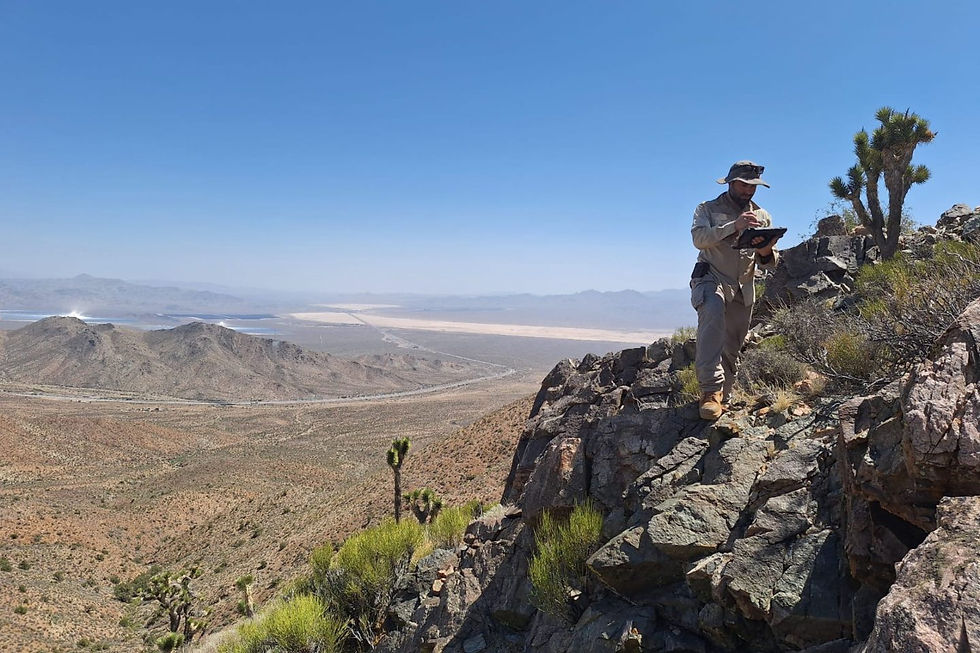Locksley Resources nabs $5.3M to fuel US antimony-rare earths drilling blitz
- James Pearson

- Aug 1, 2025
- 3 min read

The share price of Locksley Resources (ASX:LKY) surged to 14.5 cents today on massive turnover - its highest price since 2022 - after the company turbocharged its United States critical minerals push by locking in a $5.3 million war chest.
The oversubscribed capital raise, priced at 9.5c a share, drew a surge of institutional support led by heavyweight investor Tribeca Investment Partners. It was conducted under refreshed placement capacity approved at the company’s recent shareholder meeting.
Management says Tribeca’s lead role as a cornerstone investor is a powerful endorsement of Locksley’s US-facing strategy. The deal has also lured more than a dozen new institutions onto the register.
The company will use the fresh capital to kick-start a high-impact drilling blitz at its Mojave antimony and rare earths grounds in California.
Tucked deep in the Mojave Desert, Locksley’s flagship project spans more than 250 claims across two standout zones dubbed the North Block and El Campo, which both scream potential.
The North Block rubs shoulders with tenements held by US rare earths juggernaut MP Materials and hosts the historic Desert antimony mine, last worked in 1937.
El Campo runs directly along strike of MP’s fabled Mountain Pass rare earths mine and sits surrounded by MP’s ground.
Mountain Pass is America’s only rare earths project and at the heart of America’s supply chain overhaul. It first burst onto the scene in 1952 with an eye-popping 7 per cent total rare earths grade, which set the bar for decades.
From the 1960s through to the 1990s, the mine reigned supreme as the world’s primary source of rare earth elements, before China muscled in and took control of the global market.
Hosted in rare earths-rich carbonatite rocks threaded with fenite and trachyte dykes, Mountain Pass still plays a critical role, not just as a mine, but as home to one of the only rare earths processing plants in the US.
And here’s where things really start to hum for Locksley. If the drill rig hits its mark at El Campo or Desert, the nearby plant could become a ready-made, right-next-door option to process its ore - potentially slotting seamlessly into America’s push for critical metal independence.
This would likely be music to Apple Inc’s ears. The tech titan recently tipped in a cool US$500 million into Mountain Pass’s parent company to lock down a domestic supply of rare earth magnets - underscoring the strategic importance of the Mojave region.
Locksley’s upcoming exploration campaign will hit up two separate systems. The first five holes will test the El Campo prospect for rare earths over a defined 860-metre strike. Three follow-up holes will then zero in on stibnite-rich antimony mineralisation at the old-timer Desert antimony mine, eight kilometres north.
Early sampling at the company’s El Campo grounds has already thrown up some head-turning rock chips, delivering rare earth riches of up to 12.1 per cent total rare earth oxides (TREO) and 3.19 per cent neodymium-praseodymium.
Not to be outdone, the Desert prospect has coughed up rock chips grading a jaw-dropping 46 per cent antimony and 1022 grams per tonne (g/t) silver.
Despite recording huge grades, the old mine at site has never been tested with modern drilling. Now, three holes will test for stibnite-rich mineralisation using modern geophysics and targeting technologies.
We are extremely pleased with the level of demand and the quality of institutional participation in this placement. This funding places us in a strong position to execute our exploration and downstream plans across the Mojave project and unlock the full value of our US-based critical minerals portfolio. Locksley Resources chairman Nathan Lude
Both antimony and rare earths are listed as critical to US defence, semiconductors and electric vehicles. However, with no current domestic production of the former and a very limited supply of the latter, the US Government is extremely keen to rectify the situation.
In March, US President Donald Trump signed an executive order to fast-track permitting for critical mineral projects, including authorisation for direct Defence Production Act funding. The energy department’s Critical Materials Institute has also opened up new funding pathways for rare earths and antimony technologies.
Should Locksley’s latest truth telling drill program deliver the goods, the company is likely to enjoy a newfound strategic significance, which could potentially attract a sizeable chunk of government funding support.
To promote its credentials, Locksley has already engaged Washington-based advisory firm Viriathus Capital to lead government relations, secure capital markets exposure and open doors to the US defence and energy departments and the Export-Import Bank.
With drill bits now turning and the White House hungry for home-grown critical metals, Locksley’s moment in the Mojave sun might be about to shine a whole lot brighter.
Is your ASX-listed company doing something interesting? Contact: office@bullsnbears.com.au

